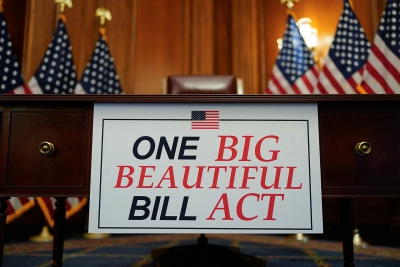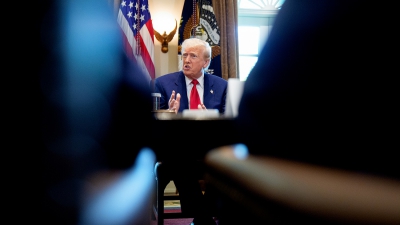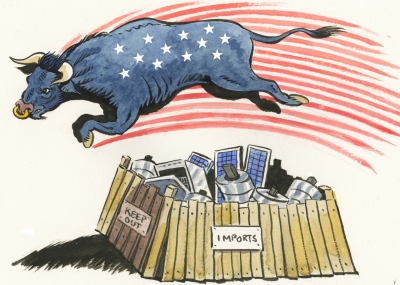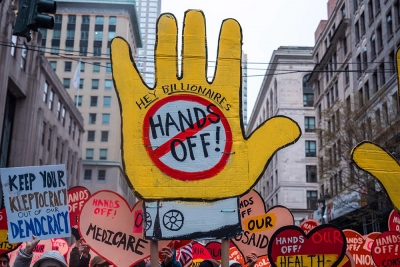
As Trump wins the election again in 2024, he and his team can't wait to start competing for Biden's term in advance, meeting with leaders of various countries, promoting the implementation of diplomacy and policy, and starting Trump 2.0 governance.
The Trump 2.0 tariffs that the Chinese were waiting to respond to with bated breath have not yet been proposed. Trump has waved his big stick at Canada, Panama and Greenland, proposing that Canada become the 51st province of the United States, demanding that the Panama Canal be taken back, and Acquisition of Greenland.

This morning, the headline of the first article on the CNN website was: Trump is considering territorial expansion. Trump released a picture and the world gasped.
This picture was first posted by his son Eric Trump. On the right side of the picture, Trump is looking at his mobile phone carefully; on the left side, the mobile phone displays a shopping list with three items in the cart.

The first one is Canada.
The second, Greenland.
The third, the Panama Canal.
The title is: We are back. Trump also retweeted it himself, using the same title: We are back.
What's back? Trump wants to take over Canada, take over Greenland, and take over the Panama Canal. Is this serious? Trump hopes to expand territory?
For a while, many people will have the illusion that this businessman seems to have turned into a warmonger, suddenly having a very strong desire and demand for territory.
Associate with the distant countries and attack the near ones?(ADAN)

ADAN was a strategy proposed by Fan Ju to the King of Qin during the Warring Period. From the literal meaning, we can know that it refers to making friends with distant countries and attacking neighboring countries.
At that time, the King of Qin was preparing to send troops to attack the State of Qi, but Fan Ju opposed it. He said, "The State of Qi is so far away from the State of Qin, with the State of Wei and Han in between. If there are fewer soldiers and horses going out, we may be defeated by the State of Qi and ridiculed by the lords of various countries; If there are too many soldiers going out, there may be chaos at home.
Even if Qi is defeated smoothly, your majesty could not move Qi to Qin. In the end, we will only let Han and Wei take advantage of the existing situation. Since distant countries have established contact with us, they will not interfere with matters unrelated to them. By taking down nearby countries, Qin's territory can be expanded. An inch of land conquered is an inch, and a foot is a foot. After annexing Han and Wei, can Qi and Chu still stand?
This method of moving from near to far like silkworms eating mulberry leaves is called 'distant communication and close attack'(ADAN)."
Upon hearing this, King Zhaoxiang of Qin clapped his hands in admiration.
This analysis is completely applicable to the United States today. Take the past as an example. The United States sent troops to Afghanistan and retreated hastily, which was ridiculed by the world. Even though it won in Iraq and defeated Saddam, in the end it was the Shiites who came to power in Iraq, allowing Iran to take advantage of it.
Back to reality, if there is less aid to Ukraine, it will not help Ukraine's defeat; if there is too much aid, the domestic financial imbalance will easily lead to chaos; even if Russia is finally defeated, it will only allow a group of Europeans to take advantage of it.
Trump understands this truth. Next, he will definitely reduce or even cut off military aid to Ukraine. In this sense, it is not entirely unreasonable for him to call himself a "peace messenger"; but for surrounding strategically important territories, he will make no secret of his territorial claims and carry out "close attacks". It would be an exaggeration to call him an "invader".
Get compensation from Song Dynasty?

After the rise of Genghis Khan, the Jin Kingdom suffered repeated defeats in battles with Mongolia and suffered huge losses in national power.
In 1217, Jin Xuanzong thought of a way to make up for the losses of the Jin Kingdom, which was to "lose it to the north and gain it from the south". This strategy was also called "compensating for the Song Dynasty". The national power lost to the Mongols , Jin Xuanzong felt that he could recover from the weak Song Dynasty by plundering land, money and food, and then he would have the strength to continue fighting with Mongolia.
The Song Dynasty was originally strict in maintaining neutrality during the Jin Mongolian War. Despite Mongolia's repeated requests to use the route to attack Jin, they were rejected by the Song Dynasty because its ministers knew they were weak. If the Jin Dynasty were to perish, they would be in despair. If it weren't for the deep historical enmity between the Song Dynasty and Jin, the Song Dynasty would even be willing to lend a helping hand to the Jin Dynasty.
However, after being beaten up by Jin Xuanzong's strategy of taking compensation from the Song Dynasty, the Song Dynasty ministers were puzzled and had no choice. The Song Dynasty was forced to form an alliance with the Mongols, and the Jin Dynasty quickly perished in the face of the Song Mongolian coalition. Subsequently, the Song Dynasty itself was also finished.
This strategy is used by Trump today.
In 2018, the United States launched a trade war against China.
A trade war is also a war. It is very expensive and has seriously damaged the national power of the United States.
After six years of trade war, the United States has suffered serious losses in national power, but it is getting further away from its goal of defeating China. Seeing that it would not work to defeat and plunder China to restore the national strength of the United States, Trump suddenly came up with a "good idea." That is to seek compensation from the Song Dynasty -- obtain national strength from its allies.
This is not a joke on the negotiating table. From any perspective, this is the US president's claim to the territories of Canada, Panama and Greenland.


If you're tough enough, it's just a joke.
If you're not tough enough, then this isn't a joke.
When Jin Xuanzong faced the Mongolian army, he probably had a similar idea, that is, defeating Mongolia was too difficult and impossible to achieve, and it would be easier to go to the Song Dynasty to grab some money, food and land. As a result of practice, this policy greatly accelerated the downfall of the Jin Dynasty.
Trump's three axes (strategies)
Canada, Panama, and Greenland are all the United States' neighbors in the Americas. They are extremely dependent on the United States for military security, economy and trade. Moreover, other powers have no fundamental interests in these countries, making it difficult for them to interfere with the actions of the United States.
Trump has no interest in territory. He pretends to be interested in order to force these three countries to make concessions. In essence, it is a businessman's logic of making exorbitant demands but settling for much less.
It requires Canada to import, Panama to reduce shipping costs, and Greenland to grant mining licenses.
Choosing the three of them this time is to pick the softest persimmon to pinch. They have weak own strength and no major powers are willing to interfere, so they can only accept Trump's demands by pinching their noses.
For comparison, we can review the three key points of Trump 1.0:
1. Use economic pressure (tariffs) to solve the U.S. trade deficit with China.
2. Use military pressure (aircraft carriers) to resolve the hostile relationship between North Korea and the United States, Japan and South Korea.
3. Use political pressure (security) to end the hostile relationship between Israel and Arab countries.
The imagination of Trump 1.0 is beautiful, but the reality is cruel.
On the one hand, externally, Trump 1.0's three axes are all cut to nuclear armed regions. These regions generally have cards in their hands to compete with the United States. Moreover, there are a large number of great powers with interests in these regions, and there are also complex vested interest groups within the US. Many times, Trump thinks he has reached an agreement with his opponent's boss, but he has not figured out who the opposing forces are, making it impossible to achieve results in the short term.
On the other hand, within the United States, the role of force is mutual. The result of Trump's comprehensive pressure in the three fields is that the United States have encountered strong reaction forces in economy (trade war confrontation), military (Northeast Asia pattern reshuffle), and politics (security and energy lobbying groups). The direct result of this reaction is that Trump’s team has split. He and his supporters have turned against each other in large numbers.
Since all three of Trump 1.0's axes have gone to attack the hard bones, many weaklings have taken advantage of the trend and become tougher on the United States. As a result, the Trump administration did not plunder enough profits before the midterm elections to feed internal interest groups and make more friends, which completely offended the original vested interest groups and pushed many Republican supporters to the Democratic Party.
The result was that in the 2018 midterm elections, he lost the House of Representatives and four governors and became a loser. In the 2020 general election, he lost to Biden due to the defection of many Republican elders.
After untold hardships and betrayal, now that Trump 2.0 has returned, he will definitely learn from the lessons of the last time. He will not smash the three axes to the stone, but choose three soft persimmons to pinch.
Faced with the crushing threat of the United States based on its strength and position, Canada, Panama, and Greenland had no choice but to compromise and let Trump start with a 3:0 victory.

In this way, Trump can not only feed the vested interest groups that support him by reducing the shipping costs of the Panama Canal, expanding exports to Canada, and obtaining mining rights in Greenland, but also continue to force other countries to compromise with him, using a snowball approach to continuously expand the territory of his interest conquest.
This is the same multiple-choice question that Zhao Kuangyin faced in the Unification War, whether to choose difficult first and then easy, or first easy and then difficult.
Unlike Trump 1.0, which chose the difficult before the easy, Trump 2.0 chose the same idea as that of Zhao Kuangyin, which was easy before the difficult, starting from the rich and weak countries in the south, first filling himself up, and then making an all-out northern expedition.
At this time, the challenge was left to Zhao Kuangyin's northern rival, whether he would interfere or make moves when Zhao was going south.















